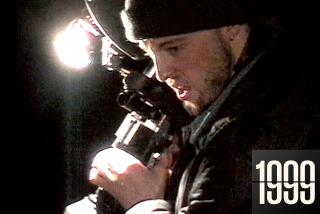What Video Folks Have in Mind for You
LAS VEGAS — What were you doing five years ago when the video revolution was exploding around you?
Sally Lasater was running a book store in Carmel. Tom Smart was a cameraman and sometime director of TV commercials in Los Angeles. Edward Goldstein was publishing Michael Shane mysteries. Jack Cannata was in the construction business in Houston. Jaime Smith was completing his 30th year in the government health care business, stationed in Japan.
This week, they are all in Las Vegas, five people among more than 11,000 who joined the revolution and are here to buy, sell or celebrate at the Video Software Dealers Assn. convention--an air-conditioned harmonic convergence where the commercial outlook is brighter than a spiritual fire.
“Video is going to do for the world what the printing press did,” said an excited Jaime Smith, whose young Colorado-based Movie Movers Inc. was about to hold an auction for 150,000 used videocassette movies. “Video is the new literature. It will bring knowledge to (the masses).”
One person’s knowledge is another’s pet rock. It’s hard to get a historical fix on the value of something like “Video Dog,” a tape that gives you the pleasure of a dog’s company without the expense of flea collars and pooper scoopers. And it’s hard to see how teaching your real dog how to do movie tricks (this tape features the trainer of “Down and Out in Beverly Hills” star Mike) will enlighten the rest of us.
The four-day video software convention ending today is a carnival of paradoxes and contrasts. There are frivolous tapes and smart tapes. Good movies and trash. Big-name celebrities (Charlton Heston, Debbie Reynolds), celebrities with big names (Bobcat Goldthwait) and porn queens with Disney names (Bambi).
You could spend half a day just filling out drawing cards. Vendors are giving away free trips, free video equipment, even an autographed tape of Clint Eastwood’s inauguration as mayor of Carmel.
The conventioneers seem willing to stand in any line that ends with an autograph or a keepsake photo. Men in suits wait up to 20 minutes to climb into a makeshift cage and have their pictures taken with two young models wearing iron bikinis. Elsewhere, women are taking “scream tests,” entering a spooky set and shrieking on cue for a video camera.
Hollywood is spending a lot of money wooing the video store owners in town. Paramount has re-created its Melrose Avenue arch. Disney has a white castle. HBO Video, which is the enviable distributor of “Platoon,” is tastelessly operating out of a Vietnam bunker.
But if your video store has given you the impression that the video revolution is strictly about movies, a tour of the convention floor will quickly erase it. Despite their ostentatious displays, the major movie tape distributors take up only a small part of the space. The greatest impression is made by the variety of instructional tapes on sale and the Klondike fervor of the entrepreneurs selling them.
The video revolution is the modern Gold Rush and people are staking their claims everywhere. Children’s video is the most popular ground, with tapes being pushed for everything from the latest Strawberry Shortcake to a 30-minute animated feature designed to help children through their parents’ divorce.
There are dozens of how-to videos on fishing and hunting and how-to-play tapes on tennis, golf and guitar. This year, just in time for Christmas, is a package for beginning harmonica players. For $19.95, you get a tape, an instruction book and a 10-hole Hohner harmonica.
Premiere Home Video’s “Bryne’s Standard Video of Pool & Billiards” has done very nicely, according to its representatives. The tape has won rave reviews from such unlikely sources as the New York Times, and Premiere is planning to follow that up with--what else?--a support video for pregnant women.
Queens, N.Y. high school teacher Peter Lanzer is selling review course tapes designed to help students pass everything from high school math to law admissions exams. The tapes are as basic as they can be, with a teacher standing at a blackboard, but they have sold so well that Lanzer says he is giving up his teaching profession to run his new company--Video Aided Instruction Inc.--full time.
Jack Cannata, the former Houston contractor, sells a series of travel tapes, mostly to travel agents who use them to help clients choose vacation packages. But the new tape entrepreneurs are flexible. Cannata also sells tapes on AIDS (produced by the University of Texas Health Science Center with school districts as sales targets) and the American space program.
Edward Goldstein, who once published such magazines as Confidential and True Confessions, is the owner of Unicorn Video, which distributes tapes of such low-budget films as “Hercules Goes Bananas,” “Drunken Cat Paws” and the redundant “Dracula Sucks.”
Tom Smart, who gave up TV commercials for video production, puts out a line of educational and corporate training tapes through his Universal Video in Westlake Village, and he distributes beauty care tape packages that include the cosmetic and nail accessories needed to follow the video instructions.
Most of the specialized tapes will never reach your local video store. You don’t get a good turnover on tapes showing you how to clean a horse’s teeth or firm your buttocks. But because those specialty tapes--and thousands more--exist, Sally Lasater started The Knowledge Collection, a Monterey, Calif.-based company that catalogues and distributes non-theatrical videos.
“The video business is like a giant funnel,” Lasater said. “You have this huge amount of material coming into the market, but very little of it actually gets to stores.”
Lasater said she set out to catalogue every instructional or educational video produced for public consumption. In three years, the number of specialized films and the market for them have grown so large that McGraw-Hill is publishing the current catalogue, with more than 6,000 separate titles, as an $8.95 paperback.
Naturally, the video industry hasn’t overlooked itself as a subject for instructional tapes. There are already institutional videos telling buyers how to stock their video stores, and at this week’s convention, a trio of Oakland TV journalists--including KTVU-TV anchorman Bob MacKenzie--introduced a 40-minute how-to tape on the use of video cameras.
But the prize for self-exploitation in the young industry goes to Camp Video for “Video Violence,” a 90-minute film that carries the ad line “A ‘must see’ for video store personnel and their customers.”
According to Camp, which also distributes such classic films as “The Incredibly Strange Creatures Who Stopped Living and Became Mixed-Up Zombies,” “Video Violence” is the story of a New York couple who open a video store in the country and discover, to their horror, that a customer has returned a tape that includes a murder he didn’t rent.
In a business where everyone seems to be making a quick killing, it was only a matter of time.






